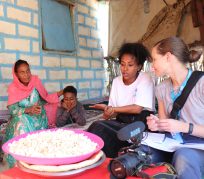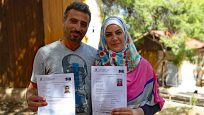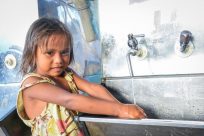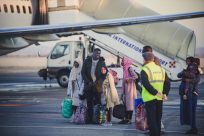From Syria to Sweden: Eiad´s perilous voyage across the Mediterranean
Eiad’s wife did not want him to embark on the perilous journey across the Mediterranean Sea to safety in Europe, but Eiad believed it was their only option. They had tried to build a new life in Egypt, but after two years in the country, Eiad realized he would not be able to provide a good future for his young children there. “Life wasn’t very good in Egypt”, he explains. In spite of his wife’s protests, Eiad decided to risk his life in a rickety boat sailing from Egypt to Italy. His wife and children returned to Damascus. “I was more worried about the kids”, he says. “I thought that if my life will finish, it will finish anyway – in Egypt, in the sea, wherever.”
After one and a half months of searching, he made contact with a human smuggler. The price for getting to Europe: 2,500 dollars. “We went in a group so it would be cheaper. The safest way to travel to Europe is through Turkey but it’s much more expensive. Sometimes, it can cost more than 8000 dollars per person” says Eiad. He describes the five-day boat journey to Italy with more than 300 others as “hell”- people were thrown into the boat and the smugglers did not care if they fell into the water. “If they had animals with them, they would take better care of them because they’re worth more to them”, says Eiad. Still, there was a sense of solidarity between passengers. Eiad recalls how two people almost fell off the boat in their sleep but were caught by the other passengers.
After reaching the shores of Italy, Eiad headed towards Northern Europe and arrived in Sweden on 12 October 2014. Coming here was a great relief, but life as a refugee has its daily struggles. “I miss my family” says Eiad, explaining how he had to adjust to his new life at the asylum-seeker reception centre in Farsta, Stockholm. “Starting over is not easy and leaving your country without your family… it’s hard. A lot of people who came here didn’t want to leave their lives behind in Syria. But it is impossible to give them back the same life here…They are forced to change” he says sadly.
For 36-year-old Eiad, a former shop and restaurant owner, living a slower paced life at the reception centre is a challenge. He often plays cards with some of the other people at the centre to make time pass faster and sometimes he also plays football. “But I have a problem with my back so I can’t do too much sport.” He believes life moves slower in Sweden. “In Syria, we do everything fast. A lot of Arabs find this very frustrating because we are always in a hurry” says Eiad with a laugh,
“We want things to happen faster, and we want to be reunited with our families sooner.”
Eiad says he has not started his life in Sweden yet, not without his family. “Your mind is not clear, it’s with your family, your kids, and you’re waiting to see them.” But despite the continuing concerns for his family, Eiad is hopeful for the future. “I want to finish my studies or work and study at the same time. I don’t like to sit still.” He hopes to use the skills he acquired as a restaurant owner in Syria to start a small restaurant in Sweden, serving Syrian food.
Eiad’s application for asylum has just been approved and he is waiting to be reunited with his wife and two sons, who are still in Syria. “My children are very excited about coming to Sweden”, says Eiad with a big smile. “My wife is worried because she doesn’t know anyone here and it’s strange for her. But I think she’s going to like it. She is an English teacher” he says proudly.
Page 28 of 33
-

UNHCR: Sweden’s support helps refugees around the world from the threat of coronavirus
27.04.2020The Government of Sweden is one of UNHCR’s largest donors and a long-time strong supporter of the global refugee response.
-

Coronavirus: UNHCR offers practical recommendations in support of European countries to ensure access to asylum and safe reception
27.04.2020UNHCR, the UN Refugee Agency, has called today on European countries to safeguard the many good practices and redouble their efforts to strengthen asylum systems in Europe in these trying times.
-

UNHCR thanks Denmark for substantial support to help protect the world’s refugees from the threat of coronavirus
24.04.2020While Europe at large is dramatically impacted by COVID-19, UNHCR, the UN Refugee Agency, welcomes Denmark’s very significant contribution of DKK 100 M (14.8 M USD) to support UNHCR’s COVID-19 appeal to protect refugees and their host communities around the world from the threat of the pandemic. This places Denmark […]
-

Displaced and stateless women and girls at heightened risk of gender-based violence in the coronavirus pandemic
20.04.2020COVID-19 is taking lives and changing communities around the world including an increase in SGBV for displaced vulnerable women and girls.
-

Stories from the Field: “We see results when refugees are allowed to contribute”
16.04.2020 -

UN agencies welcome first relocation of unaccompanied children from Greece
15.04.2020Agencies urge other EU Member States to also follow through on relocation pledges.
-

The Council of Europe and UNHCR support Member States in bringing refugee health workers into the COVID-19 response
14.04.2020Joint press release by the Council of Europe and UNHCR encourages States to benefit from the support refugee health professionals can provide to national health systems during the COVID-19 outbreak.
-

“I learned to stop crying for myself a long time ago”
03.04.2020Second Chances: Elisha’s story of finding refuge in Denmark is one of seeking stability, contemplation, perseverance and aspiration for the future.
-

The rights and health of refugees, migrants and stateless must be protected in COVID-19 response
01.04.2020Joint press release from OHCHR, IOM, UNHCR and WHO
-

IOM, UNHCR announce temporary suspension of resettlement travel for refugees
18.03.2020Due to the COVID-19 global health crisis and restrictions around international air travel, resettling refugees are currently subject to severe disruptions.
